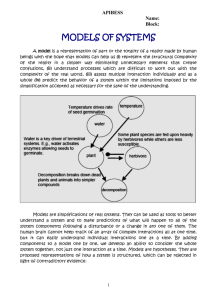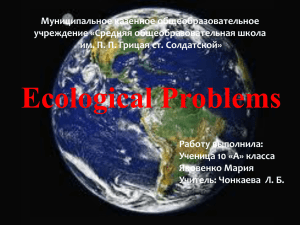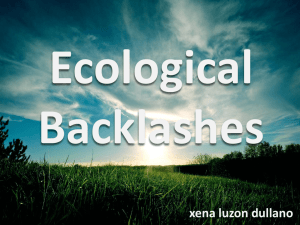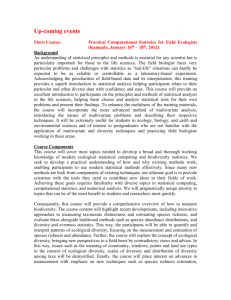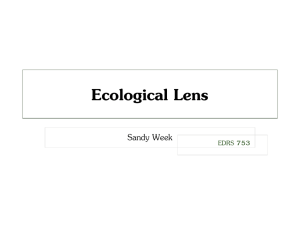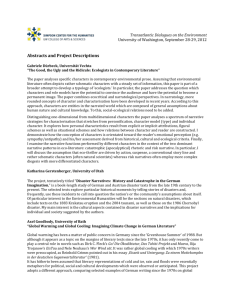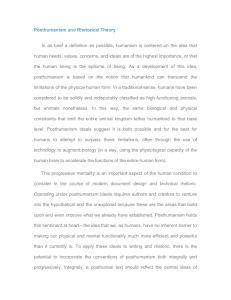Composting_Culture
advertisement
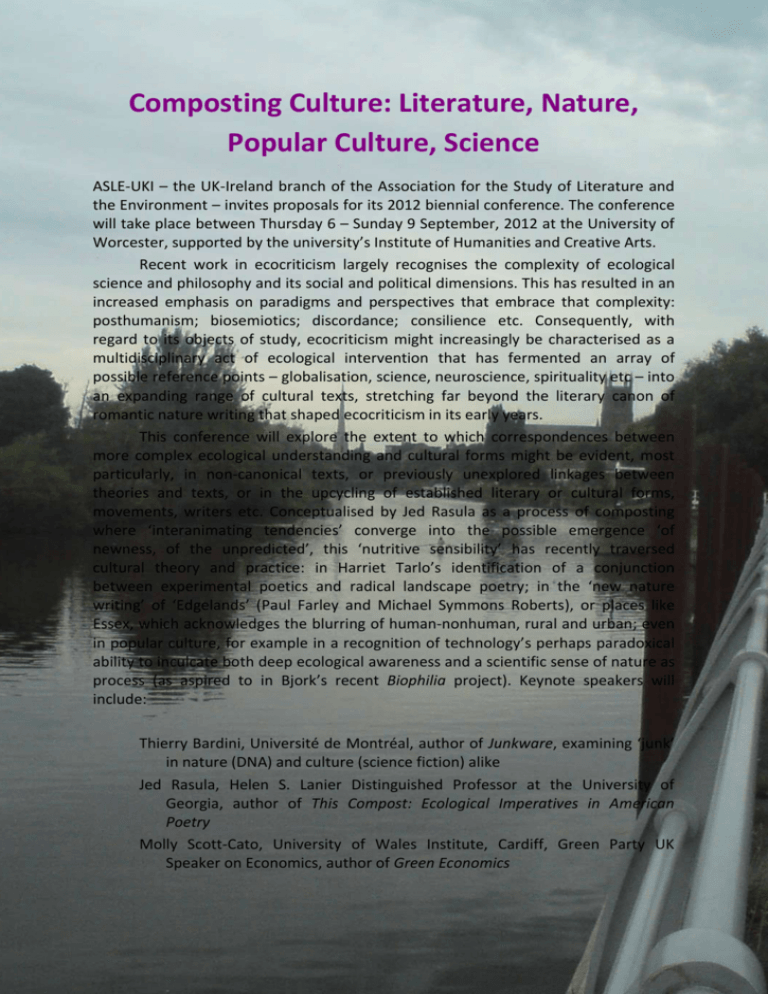
Composting Culture: Literature, Nature, Popular Culture, Science ASLE-UKI – the UK-Ireland branch of the Association for the Study of Literature and the Environment – invites proposals for its 2012 biennial conference. The conference will take place between Thursday 6 – Sunday 9 September, 2012 at the University of Worcester, supported by the university’s Institute of Humanities and Creative Arts. Recent work in ecocriticism largely recognises the complexity of ecological science and philosophy and its social and political dimensions. This has resulted in an increased emphasis on paradigms and perspectives that embrace that complexity: posthumanism; biosemiotics; discordance; consilience etc. Consequently, with regard to its objects of study, ecocriticism might increasingly be characterised as a multidisciplinary act of ecological intervention that has fermented an array of possible reference points – globalisation, science, neuroscience, spirituality etc – into an expanding range of cultural texts, stretching far beyond the literary canon of romantic nature writing that shaped ecocriticism in its early years. This conference will explore the extent to which correspondences between more complex ecological understanding and cultural forms might be evident, most particularly, in non-canonical texts, or previously unexplored linkages between theories and texts, or in the upcycling of established literary or cultural forms, movements, writers etc. Conceptualised by Jed Rasula as a process of composting where ‘interanimating tendencies’ converge into the possible emergence ‘of newness, of the unpredicted’, this ‘nutritive sensibility’ has recently traversed cultural theory and practice: in Harriet Tarlo’s identification of a conjunction between experimental poetics and radical landscape poetry; in the ‘new nature writing’ of ‘Edgelands’ (Paul Farley and Michael Symmons Roberts), or places like Essex, which acknowledges the blurring of human-nonhuman, rural and urban; even in popular culture, for example in a recognition of technology’s perhaps paradoxical ability to inculcate both deep ecological awareness and a scientific sense of nature as process (as aspired to in Bjork’s recent Biophilia project). Keynote speakers will include: Thierry Bardini, Université de Montréal, author of Junkware, examining ‘junk’ in nature (DNA) and culture (science fiction) alike Jed Rasula, Helen S. Lanier Distinguished Professor at the University of Georgia, author of This Compost: Ecological Imperatives in American Poetry Molly Scott-Cato, University of Wales Institute, Cardiff, Green Party UK Speaker on Economics, author of Green Economics Along these lines, we now invite papers and proposals that can offer, most particularly, a focus on hitherto neglected or unexplored interconnections between authors, texts, genres, and cultural forms. These might relate, but are not restricted to, the following themes: Recycling, composting, fermenting, or junk as cultural tropes ‘New nature writing’ Green media and popular culture Posthumanism Biosemiotics and Zoosemiotics Ecological discordance or complexity The canon and ideas of cultural value etc Environmental (in)justice Toxicity Consilience: ecological science and cultural/literary texts New perspectives on Romanticism Ecopoetics/landscape poetry Postcolonialism or globalisation Biotechnology and ecotechnology ‘Edgelands’ Rhetoric, metaphor or narrative Nature, post-nature, ‘second nature’ ‘Social Ecologies of the Imagination’ Individual papers should be 20 minutes. Please send a title and 250 word abstract to David Arnold: d.arnold@worc.ac.uk and John Parham j.parham@worc.ac.uk by the deadline, Wednesday 29 February 2012. Further details – including registration costs and accommodation – will be circulated in the Spring. Our intention is to offer video conferencing, allowing for the participation of international delegates unable or reluctant to travel. The conference is to be located in the historic city of Worcester and accommodation will be reserved at one of the university’s two campuses. The university is in easy reach of diverse landscapes: the Geopark Way, which explores 700 million years of geological history; or the River Severn floodplain grasslands and rare meadows. Considering the interaction between human settlement and environment, one might take a walk on the Worcester and Birmingham canal; or visit the Malvern Hills Area of Outstanding Natural Beauty with its rich acid grassland and grazing sites, views of the Welsh Marches, iron-age earthworks, commons, and ancient semi-natural woodlands; or the local ancient orchards maintained by volunteers. With this in mind, at least one half day excursion, with a choice of locations, will be included in the conference schedule. There will also be a conference dinner at The Fold, a local eco café and arts and design centre, and the focus for a range of activities relating to sustainable development.



